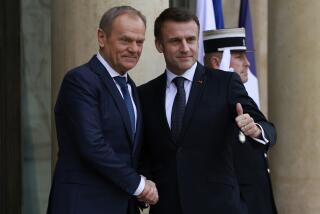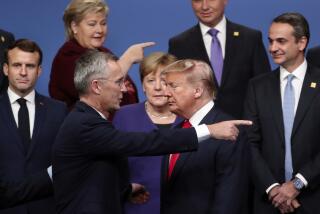THE TIMES POLL : One Germany: U.S. Unfazed, Europeans Fret
- Share via
Americans are not worried about the prospect of a reunified Germany once again dominating Europe, but the notion scares people in Poland and concerns the British and French, according to a survey conducted jointly by The Times Poll and The Economist.
In the abstract, Americans and the French overwhelmingly favor the idea of reuniting West Germany and East Germany nearly 45 years after the crushing defeat of Adolf Hitler’s Third Reich. But the British are less enthusiastic, and the Poles are split on the issue.
The poll posed identical questions to people in the United States, Great Britain, France and Poland. It was clear from the survey that the wounds of Nazism have not healed in Poland, whose invasion by Germany more than a half-century ago ignited World War II.
And varying responses in the United States, Great Britain and France indicated that it will not be easy for Western leaders with political antennas to reach agreement on the future of the two Germanys because citizen views on the subject differ from nation to nation.
For this transatlantic project, The Times Poll, directed by I. A. Lewis, interviewed 1,160 American adults by telephone last Saturday. During an overlapping four-day period, The Economist, a British newsmagazine, conducted interviews by telephone with 504 adults in Britain, 511 in France and 502 in Poland. The margin of error for the U.S. portion of the survey is four percentage points in either direction. For each of the three European countries, the error margin is five points.
The sensitive issue of German reunification has been a prime topic for world leaders, academicians and journalists since pro-democracy movements last year began tearing down the Iron Curtain and toppling Communist regimes of the Soviet Bloc, including East Germany.
When ordinary citizens in the four surveyed nations were asked whether they believe the two Germanys should be reunited, 61% of the people in both the United States and France favored the idea. No more than 15% were opposed. But in Britain, the concept was favored by just 45% to 30%. And the Poles were statistically split, with 41% in favor and 44% opposed. (The rest were neutral or didn’t know.)
Reunifying Germany in theory is one thing. But if that country should subsequently emerge as the most powerful nation in Europe, then this prospect bothers the Europeans who suffered from German military ambitions and Nazi atrocities in World Wars I and II.
Among the Poles, 69% said they would “worry” about a reunified Germany becoming “the dominant power in Europe.” Only 25% would not worry. In both Britain and France, a dominant Germany would disturb 50% of those surveyed. It would not bother 37% of the British and 43% of the French.
By comparison, Americans seemed rather blase about the idea of Germany again dominating Europe. It concerned only 29% and posed no problem for 62%.
What worried the Poles most about a dominant Germany was the possibility that it “may try to expand its territory again” or “lead to a revival of Nazism.” The British also feared a resurgence of Nazism. The chief concern of the French, on the other hand, was that “the German economy may become too strong.”
One of the stickiest questions to be answered about possible reunification is where the new Germany would fit militarily. With West Germany now providing the front lines for NATO and East Germany serving as the forward outpost for the Warsaw Pact, reunification would dramatically alter the European military map.
The Poles, by a margin of roughly 5 to 3, said a reunified Germany should avoid any military pact and be neutral, presumably like Austria.
People in France--which is not a member of NATO but is an integral part of the Western military alliance--believed by a 4-to-3 margin that a reunified Germany should belong to NATO. In the two surveyed NATO countries--the United States and Great Britain--citizens, by roughly 2 to 1 and 3 to 1 respectively, advocated making a reunified Germany a member of their alliance.
Most Americans and British wanted to keep the U.S. military at its present strength in Europe. More than 300,000 U.S. troops now are based there. The French and Poles, however, were split on this question.
Among those who oppose reducing U.S. forces, the Americans, British and French view these troops principally as a means of maintaining the Atlantic Alliance and providing the defense against potential Soviet aggression. But the Poles have another reason, one rooted in the history of Central Europe. They believe the U.S. military is needed “to help offset Germany’s new power” if reunification becomes reality.
People in all four surveyed countries believe overwhelmingly that the European Community--the 12 Western European nations that have formed a powerful economic bloc--should accept new members from Eastern Europe.
Poland, where Lech Walesa’s Solidarity movement sparked an anti-Communist revolution, appeared to be supremely confident that democratic reforms will survive in Eastern Europe regardless of whether Soviet President Mikhail S. Gorbachev manages to hold on to power. Nearly three-fourths of the Poles felt the reforms will stay with or without Gorbachev.
But people in the Western countries were not so sure. The French tended to believe that the new reforms are sufficiently entrenched to survive without Gorbachev. But the Americans were divided on the question, and most of the British thought the fates of the reforms and the Soviet leader are intertwined.
Among those surveyed, 6 in 10 of the Poles and French, slightly more than half the British and 4 in 10 of the Americans said a relative either had been killed or wounded in one of the world wars.
The Poles and French directly affected by the wars were slightly less supportive of German reunification than were people whose families had escaped harm. But family war histories did not seem to make a difference in the attitudes of Americans and the British.
Do you favor or oppose reunification of Germany?
Britain France Poland U.S. Favor 45% 61% 41% 61% Oppose 30% 15% 44% 13% Neutral 19% 19% 14% 9% Don’t know 6% 5% 1% 17%
Do you think the democratic reforms would or would not survive in Eastern Europe if Mikhail Gorbachev lost power in the Soviet Union?
Britain France Poland U.S. Would survive 32% 42% 72% 38% Would not survive 50% 32% 23% 38% Don’t know 18% 26% 5% 24%
Sources: In United States, Los Angeles Times Poll conducted survey. In other nations, M.O.R.I. Ltd. conducted survey for The Economist magazine.
More to Read
Sign up for Essential California
The most important California stories and recommendations in your inbox every morning.
You may occasionally receive promotional content from the Los Angeles Times.














